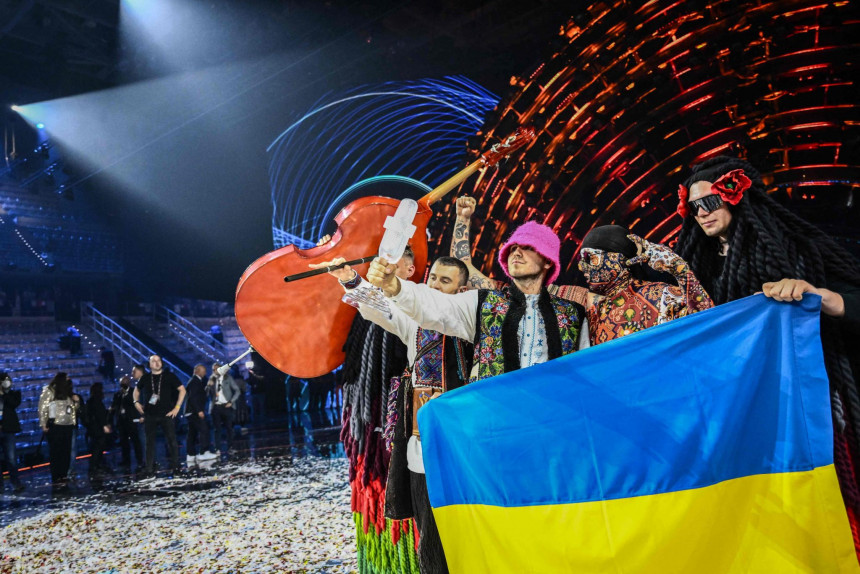Ukraine wins Eurovision, Latvia is far from the dream of the final

As it was easy to predict, the 66th International Eurovision Song Contest was won by the Ukrainian representatives Kalush Orchestra with the song "Stefania", who were not the best even in their own country. As for the Latvian representatives, all the speculation about why they did not make the final was pointless - the jury and, even more so, the TV audience did not like Citi Zēni.
After the official results of Eurovision were published, it became clear that Latvia had fared rather badly in the first semi-final: Citi Zēni came 14th, ahead of only Austria, Bulgaria and Slovenia. The 55 points also put Latvia ahead of five losers from the second semi-final (San Marino, Ireland, Malta, Montenegro and Georgia), and even this number of points has been rare for Latvia at Eurovision in recent years. For example, the ambitious Samanta Tīna scored just 14 points last year. Since 2009, Latvia has only been in the final twice (!) (Aminata in 2015 and Justs in 2016), but ten times (now 11) our shots have missed the target, so it's only natural. That's for those whose glass is always half full. The rest of us can look at these results through a different prism.
Before the final, there was also a version that we were snubbed by the jury of other countries because of the rude first line of their song "Eat Your Salad", while the TV viewers were delighted, but the official results show a completely different picture: the jury put Citi Zēni even in the respectable 11th place. The viewers left the Citi Zēni only in 15th place with 16 points, the lion's share of which came from our braliukas Lithuanians, another five points from the Ukrainian viewers (probably voting from here), and a point from the Netherlands. Incidentally, this was predicted by the author three months ago, when I headlined my piece on February 14 "Eurovision will hear us, but not understand us"... Seeing these results, it is hardly worth hoping for a breakthrough for Citi Zēni in the context of Eurovision in the Western market, because Europe says "sorry, eat your own salad!"

Perhaps we should really study the Eurovision practices of our neighboring countries more closely, because Estonia and Lithuania did make it to the final, and with two different scenarios - Estonian Stefan was almost considered one of the favorites for the whole contest, while Lithuanian Monika was predicted to finish even below us, but they came one after the other in the final (Estonia in 13th place, Lithuania in 14th). On the other hand, what is there to study when there are no formulas and calculations in Eurovision?! Maybe we need to gather people experienced in pop music who will calculate with mathematical precision what the average European listener needs? The Norwegians did it, their "wolves" were locally acclaimed, but the result is tenth place. Maybe we should send names that are already well-known in the European scene to Eurovision? Finland, The Rasmus, 21st place. Maybe we need the support of the tabloid press, so famous names? The daughter of the legendary Czech goalkeeper Dominik Hašek, with her project We Are Domi, was only 22nd. Maybe the bookmakers could help with their predictions? Their top places were the Netherlands and Poland, who finished outside the top ten, but Serbia is fifth and the Portuguese ninth... But maybe it's better not to get too worried about all this, that is, just enough to avoid sending something as terrible as Germany to Eurovision (or Denmark, who got stuck in the semi-finals), whose representative in the final very convincingly (and deservedly) came last.
About the best. If the international Eurovision Song Contest had been held at any other time than now, the stylish Brit Sam Ryder and the very Eurovision-appropriate Swede Cornelia Jacobs, who were also placed first and second by the jury, would have been competing for the win, but of course during World War III, first place went to Ukraine. Interestingly, the Ukrainian Kalush Orchestra were not even voted the best in their own country. The winner of the Ukrainian national selection was the singer Alina Pash, but a very tricky situation happened to her. Despite her patriotic image, since the occupation of Crimea in 2014, the singer once performed on the peninsula, which she explained by the fact that Crimea is invariably part of Ukraine and she went to Ukraine to perform. After winning the selection, she was of course reminded of this trip. Alina was accused of false patriotism and, not wanting to face the growing backlash, withdrew from Eurovision. Thus, the ethno-rap group Kalush Orchestra, which came second in the national selection and is based on Oleh Psyuk's rap group Kalush, was sent to Turin.
The Ukrainian song "Stefania" is dedicated to Oleh Psyuk's mother Stefania. It was written before the war, but now the lyrics "I'll always find my way home, even if all roads are destroyed" have taken on a whole new and much deeper meaning. At the post-competition press conference, Psyuk thanked everyone who had supported Ukraine in the competition and used the large audience to appeal for help for Ukraine, Mariupol and Azovstal. "The victory is very important for Ukraine, especially this year. So thank you from the bottom of our hearts. Glory to Ukraine!" said Oleh Psyuk. Ukrainian President Volodymyr Zelensky congratulated the winners and said that Ukraine will do its utmost to organize next year's contest in Mariupol. This is the way it should be, and we believe it will be.
Eurovision Song Contest 2022
- Ukraine. Kalush Orchestra - "Stefania" (631 points)
- The United Kingdom. Sam Ryder - "Spaceman" (466 points)
- Spain. Chanel - "SloMo" (459 points)
- Sweden. Cornelia Jakobs - "Hold Me Closer" (438 points)
- Serbia. Konstrakta - "In Corpore Sano" (312 points)
- Italy. Mahmod & Blanco - "Brividi" (268 points)
- Moldova. Zdob si Zdub - "Trenuletul" (253 points)
- Greece. Amanda Georgiadi Tenfjord - "Die Together" (215 points)
- Portugal. Maro - "Saudade Saudade" (207 points)
- Norway. Subwoolfer - "Give That Wolf A Banana" (182 points)
